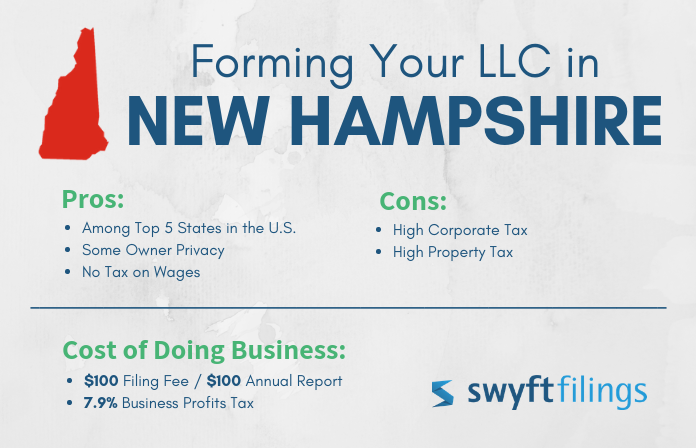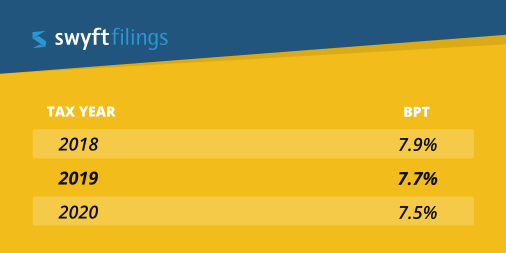State Guides
Guide to Forming an LLC in New Hampshire

Follow our free guide to form an LLC in New Hampshire
- Pros and Cons of Forming an LLC in New Hampshire
- Starting Your New Hampshire LLC
- Maintaining Your New Hampshire LLC
- Additional New Hampshire Resources
Creating an LLC in New Hampshire includes multiple steps that can seem daunting. Our comprehensive guide is divided into two main phases to help you better understand how to form your LLC in New Hampshire.
Pros and Cons of Forming an LLC in New Hampshire

Pros
Among Top 5 States in the U.S.
According to a recent report by US News, New Hampshire ranks #5 in the nation; its highest marks were given for education, health care, quality of life, and opportunity.
Some Owner Privacy
New Hampshire does not require that all the LLC owners/members be listed in the Certificate of Formation; however, the primary member/manager must sign the paperwork.
No Tax on Wages
New Hampshire is one of the few states in the US that does not tax wages/salaries. There is a low 5% tax on dividends and interest.
Cons
High Corporate Tax
New Hampshire’s corporate tax rate (BPT) is on the higher end of the national scale. Some business owners may even have to pay a second business tax — the Business Entity Tax.
High Property Tax
New Hampshire residents are levied with a 5.6% property tax, which is actually the second highest property tax per capita in the US. Two-thirds of all state and local taxes collected in New Hampshire are property taxes.
Cost of Doing Business
- $100 filing fee/$100 annual report
- 7.9% Business Profits Tax
Phase One: Starting Your New Hampshire LLC
Forming a new LLC in New Hampshire does not have to be stressful. In fact, the process is not that difficult when you have experienced help. Start today by following these steps:
- Step 1: Name your LLC
- Step 2: Establish Ownership of your LLC
- Step 3: Decide on a Registered Agent
- Step 4: File the Certificate of Formation
- Step 5: Create your Operating Agreement
- Step 6: Register for an EIN
Step 1: Name Your New Hampshire LLC
Setting up your New Hampshire LLC begins with choosing a name for your business. As you make your list, remember that both the state and federal government have guidelines concerning business names.
Tip: Use a free business name search tool to ensure your company’s desired name is available.
Business Name Guidelines
- The official name of your business must end with: Limited Liability Company, Limited Company, LLC, or L.L.C.
- Your business name cannot be intentionally misleading to consumers
- The name of your new LLC must not be similar to another organization’s name/trademark
Restrictions
- “Lottery” and “Bank” are ineligible for use (any state)
- Terms that represent educational or Veterans’ organizations are restricted
- Terms related to the Armed Forces or civil servants (police, EMT, fire)
LLC business names associated with government and/or financial entities are not always restricted - it depends on the state. Additional paperwork may be required.
URL Availability
Creating an online presence for your New Hampshire LLC is important in the current culture. After you have selected a business name, check domain name availability at a number of online web services sites.
Step 2: Establish Ownership
The owners of an LLC are referred to as members and managers. All LLCs have members, but not every LLC has will have managers — it depends on the management structure of the business.
LLC Management Structures:
- Member-managed: All members participate in operating and making decisions for the LLC
- Manager-managed: An appointed manager oversees the daily operations of the LLC and the members are not actively involved.
New Hampshire LLC Member Guidelines
Required Number of Members
There must be at least one member or manager to form an LLC in New Hampshire.
Member Disclosure Requirements
New Hampshire requires that one member/manager sign the Certificate of Formation.
Age Restrictions
LLC members in New Hampshire may be of any age.
Residence Restrictions
There are no residency restrictions imposed on LLC members in New Hampshire.
Step 3: Find a Registered Agent in New Hampshire
The registered agent is a necessary part of any New Hampshire LLC. Your business must have this position in order to legally operate.
What is a registered agent?
A registered agent can be a person or business who accepts all official mail and service of process notices on behalf of the LLC.
Why do you need a registered agent?
New Hampshire law requires you to appoint a registered agent so that your LLC has a consistent contact person.
What are the main requirements for a registered agent?
- The registered agent must have a physical address — not a P.O. Box
- The registered agent must be available during business hours
Who can be a registered agent in New Hampshire?
- A state resident with a physical address in New Hampshire
- An LLC or corporation that is licensed to conduct business in New Hampshire
Is the registered agent’s contact information publicly accessible?
The name and contact information of the LLC’s registered agent is a matter of public record.
Can I be my own registered agent for my business?
You are legally allowed to be your own registered agent as long as you have a physical address in New Hampshire.
Is being my own registered agent discouraged?
LLC business owners risk compromising their personal information if they choose to be their own registered agent.
Tip: Avoid the hassles and choose Swyft Filings to fill the registered agent needs for small businesses in New Hampshire. Find more information here.
Step 4: File the Certificate of Formation
The most important step in creating your New Hampshire LLC is filing the Certificate of Formation with the Secretary of State.
What is the Certificate of Formation?
The Certificate of Formation is a legally binding document that is filed with the state government to officially and legally form your LLC.
Why do I need the Certificate of Formation?
Your LLC business in New Hampshire will not be legally recognized by the Secretary of State without filing the Certificate of Formation.
What information is included in the Certificate of Formation?
- The name and address of the LLC
- The name and location of the registered agent
- The name of the member/manager filing the paperwork
- The purpose of the business
- The chosen LLC management structure
Additional New Hampshire Filing Information — Professional LLCs
New Hampshire allows professional service businesses to form an LLC known as a Professional Limited Liability Company (PLLC).
The following professions are allowed to form a PLLC:
- Accountants
- Attorneys
- Physicians and Medical Professionals
- Professional Counselors and Psychologists
- Architects and Engineers
- Veterinarians
- Social Workers
A few points to consider:
- The business name must include “PLLC” or “Professional Limited Liability Company”
- All members of the PLLC must be licensed in the profession of the business.
- The PLLC is only allowed to provide services for which the business was formed.
- The members are still subject to whichever licensing boards govern the PLLC’s profession.
Step 5: Create an LLC Operating Agreement
An LLC Operating Agreement is not required by the state, but it is still necessary for the overall long-term success of your New Hampshire LLC.
What is an LLC Operating Agreement?
The LLC Operating Agreement is a legally binding document that defines the rights and responsibilities of the members/managers and lays out the details involving the business’s operating procedures.
Why do I need an LLC Operating Agreement?
The LLC Operating Agreement is necessary for the business because it protects business assets, gives structure to the LLC, and reduces the chance of disputes among members.
Do I need to file the LLC Operating Agreement?
You do not need to file the Operating Agreement with the state; it is for the benefit of your LLC and remains in-house.
What goes into an LLC Operating Agreement?
While your LLC Operating Agreement should be tailored to your business, most documents include the following information:
- List of the members/managers and their roles
- Designation of authority in the LLC
- Initial capital contributions of the members
- Voting designations and percentages of the members
- Member transfer/addition rules and restrictions
- Distribution of profits
- Meeting schedule
Tip: Get a customized LLC Operating Agreement for your small business with Swyft Filings. Add structure to your LLC now.
Step 6: Register for an EIN
Businesses in New Hampshire must register for an EIN. Your LLC may not be able to conduct business without this ID.
What is an EIN?
The EIN is a nine-digit number that is assigned to your business by the Internal Revenue Service (IRS) and identifies your business with the government much like a personal Social Security number.
What does EIN stand for?
EIN is an acronym for Employer Identification Number. It is also known as a Federal Tax ID.
Are all businesses required to have an EIN?
Federal law dictates that certain types of business entities register for an EIN:
- Any business with employees (even if owned by one person)
- Any business with more than one member
- A partnership (LLC or C-corp)
Please Note: A sole proprietorship is not required to have an EIN, but it is still recommended.
Why does my LLC business need an EIN?
The more common reasons you would need an EIN are:
- To hire employees
- To open a bank account in the U.S.
- To file your company’s taxes
- To pay independent contractors
In short, if you make money through your business and employee anyone other than yourself, you must have an EIN.
Is the EIN publicly listed?
The EIN for your LLC will be part of public record.
Can I use my Social Security Number as the EIN?
If you are a sole proprietorship who wants an EIN for your business, you can elect to use your social security number; however, your EIN is part of public record.
Swyft Filings offers EIN services for small businesses in New Hampshire. Find more information here.
Phase Two: Maintaining Your New Hampshire LLC
Now that you have finished the initial phase of setting up your New Hampshire LLC, the following steps help move your business forward and stay compliant. The next few steps are:
- Step 1: Register for Taxes in New Hampshire
- Step 2: Apply for Permits and Licenses
- Step 3: File the Annual Report
- Step 4: Request a Certificate of Good Standing
Step 1: Register for New Hampshire State Taxes
All businesses in New Hampshire are required to pay two types of taxes:
- Business Entity Tax (BET)
- Business Profits Tax (BPT)
Business Entity Tax
The BET is based on the sum total of a business’s enterprise value tax base (EVTB). The three factors that comprise the EVTB are:
- Total compensation accrued/paid
- Total interest accrued/paid
- Total dividends paid
The state legislature initiated changes in the BET rate, which is scheduled to decrease on December 31st of the following tax years:

Important: Business with more than $208,000 in gross receipts or an EVTB over $104,000 must file a BET return.
Business Profits Tax
The BPT is a flat rate tax that is charged to all businesses operating in New Hampshire. See chart below for tax rate information:

State Income Taxes
While New Hampshire does not have tax W-2 wages, there is a flat 5% tax on dividends and interest.
Additional Tax Information
Other taxes your LLC may need to pay:
- Employee Withholding Tax
- Unemployment Tax
Please Note: New Hampshire does not have a state sales and use tax.
Step 2: Obtain Business Licenses and Permits
The licenses and permits required for an LLC in New Hampshire can vary, depending on a number of variables:
- Location (city and county)
- Type of Business
- Industry
Tip: If you would like to see more in-depth information on licenses and permits, please feel free to visit the content in our learning library that covers business licenses and permits.
Step 3: File an Annual Report
All businesses formed in New Hampshire are required to file an annual report with the Secretary of State.
What is an annual report?
An annual report is a legal form that updates your business’s information with the Secretary of State.
What kind of information is in the annual report?
The information requested in the annual report is similar to what is in the Certificate of Formation:
- The name and address of the business
- The name and address of the registered agent
- The names of the members
- The business’s EIN
Is the annual report part of public record?
The annual report filed on behalf of your LLC is a matter of public record.
Fees and Due Date
Fee: $100
Due Date: Jane 1st — April 1st
Frequency: Every year
Implications of Late Filings: $50 late fee/LLC dismissal after 2 years
Swyft Filings helps you stay compliant by providing stress-free solutions. File your annual report with us today.
Step 4: Request a Certificate of Good Standing
There is still one last step in forming your New Hampshire LLC — securing a Certificate of Good Standing for your business.
What is a Certificate of Good Standing?
The Certificate of Good Standing is an official notification that confirms your business is properly formed and is in compliance with all state regulations.
Who issues the Certificate of Good Standing?
The Certificate of Good Standing is generally issued by the Secretary of State.
When can I request a Certificate of Good Standing for my business?
You will be able to request a Certificate of Good Standing after your LLC is officially formed through the Secretary of State.
Why do I need a Certificate of Good Standing?
The Certificate of Good Standing provides validation from the state for banks and other businesses that your LLC is in proper compliance with all rules and regulations.
Does the Certificate of Good Standing have an expiration date?
The Certificate of Good Standing does not expire/does not need to be renewed.
Swyft Filings can create a Certificate of Good Standing for your New Hampshire LLC. Click here for more information.
